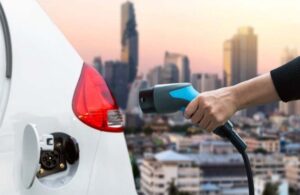In efforts to inject investments in the growing sector of electric vehicles, India’s government and the World Bank have been discussing the possibility to introduce a risk-sharing mechanism to compensate banks giving loans for electric vehicle purchases.
 The risk instrument will help banks hedge against loan defaults and cut the cost of financing EVs, India’s Group of 20 sherpa Amitabh Kant said on the side-lines of an industry event in New Delhi.
The risk instrument will help banks hedge against loan defaults and cut the cost of financing EVs, India’s Group of 20 sherpa Amitabh Kant said on the side-lines of an industry event in New Delhi.
Kant was chief executive of government think tank NITI Aayog until June this year, spearheading state policy decisions across the economy.
The switch to clean transport in the South Asian nation is slower than in the US and China in part due to the sluggish adoption of battery-powered vehicles.
The high cost of these vehicles and insufficient charging stations are major barriers, according to some reports that by 2040, 53 percent of new car sales in India will be electric, well behind China at 77 percent.
Banks in India have been reluctant to give loans for EV purchases at a time when the cost of ensuring these vehicles is high and the resale market remains small, said Kant, who was recently appointed India’s main negotiator when it becomes the chair of the G20 countries in December.
The World Bank will set up a $1 billion fund with an Indian bank that will be made available to all financial institutions, a senior NITI Aayog official working on the project said.
The fund will provide first-loss guarantees to lenders in case of loan defaults, said the official, who declined to be named as discussions are still private.
An India representative for the World Bank did not respond to calls and an email seeking comment.
India has been pushing to decarbonize its transport sector, which accounts for 13.5 percent of the country’s total emissions, as it looks to achieve its goal of becoming net carbon zero by 2070.
The government expects investments in the Indian EV industry to more than triple to $20bn by 2030, from $6bn in 2021.
